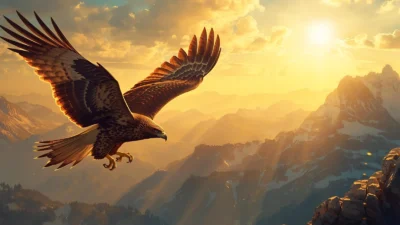When I was a child, I remember reading fairy tales where monsters lurked in dark forests and shadowy caves. They frightened me at first, but as I grew older, I realized something deeper: monsters in stories are never just about fangs, claws, or terrifying faces. They represent fears, emotions, and truths that live inside of us.
The spiritual meaning of seeing a monster symbolism in literature goes beyond scary creatures. Monsters symbolize hidden fears, inner battles, social struggles, and even transformation. They force us to face what we avoid, to understand the shadows in our hearts, and to grow stronger.
In this article, we’ll explore how monsters in literature and film hold deep meaning, how they act as metaphors, and why they matter in our lives today. Whether you’ve been drawn to monster stories, noticed their symbolism in books, or wondered why they haunt your imagination, you’re about to see them in a whole new spiritual light.
Monsters in Literature and Film
From ancient myths to modern movies, monsters have always captured human imagination. In literature, monsters are more than terrifying beings—they are symbols of human emotions, cultural fears, and moral lessons.
- In Greek myths, creatures like Medusa or the Minotaur represented punishment, chaos, and the dangers of human pride.
- In medieval stories, dragons symbolized greed, temptation, or spiritual battles.
- In modern films, monsters often stand for societal issues: Godzilla reflects fear of destruction and war, while zombies mirror anxiety about conformity or loss of humanity.
The spiritual meaning of seeing a monster in literature or film is often about recognizing the shadow side of life. Monsters show us what happens when we suppress truth, avoid growth, or let fear control us. They act as mirrors, forcing us to acknowledge hidden realities.
Monster Metaphor Examples
Monsters are powerful metaphors. They embody what we don’t want to face. Here are some clear examples:
- Frankenstein’s creature → Symbolizes rejection, loneliness, and the consequences of playing with life and morality.
- Dracula → Represents fear of death, seduction, forbidden desire, and power struggles.
- Werewolves → A metaphor for inner rage, uncontrollable impulses, and the wildness within humanity.
- Zombies → Stand for mindless conformity, fear of disease, and the loss of individuality.
- Aliens in sci-fi → Reflect fear of the unknown, invasion, or cultural clashes.
Spiritually, these monsters are not here to harm us but to teach us. They remind us that healing begins when we face the shadow, not when we run from it.
Monster Energy
When we speak about “monster energy”, we aren’t only referring to the famous energy drink. Spiritually, monster energy means the raw, untamed force that monsters symbolize.
- It is the energy of fear, but also of transformation.
- It is the feeling of being confronted with something bigger than yourself.
- It can feel chaotic, but when understood, it can push you toward growth.
In literature, “monster energy” is the force that drives characters to face trials. For example, Beowulf facing Grendel is not just a hero fighting a beast—it is a soul confronting darkness to bring light back to the community.
When you encounter “monster energy” in your own life—whether through dreams, stories, or feelings—it may signal that you are facing your own inner trials. The monster is not there to destroy you. It is there to push you to evolve spiritually.
Monster Energy Symbolism in Literature
In literature, monster energy symbolism points to moments of conflict, transformation, or spiritual awakening.
- Monsters appear when a character needs to face their fears.
- They show up when societies need to face their collective shadow.
- They symbolize tests—spiritual, emotional, or moral.
For instance, in Mary Shelley’s Frankenstein, the monster’s energy is not just horror—it is the spiritual energy of consequence and responsibility. In The Odyssey, monsters like Scylla and Charybdis represent life’s unavoidable challenges.
Whenever monsters appear in stories, they signal spiritual crossroads. They ask: Will you stay afraid, or will you find courage? Will you ignore the shadow, or will you grow from it?
Monster Symbolism in Literature Wikipedia
If you search “monster symbolism in literature” on Wikipedia, you’ll find that monsters are described as representations of cultural fears, myths, and archetypes. While Wikipedia gives a factual view, the spiritual layer goes deeper.
Spiritually, monsters are seen as archetypal teachers. They don’t just reflect society; they reflect the soul’s hidden lessons. Wikipedia might categorize them as literary devices, but in spiritual practice, they are guides that whisper:
- Face your shadow.
- Transform your fear into wisdom.
- See the monster not as the end, but as the beginning of strength.
So while Wikipedia offers structure, the heart of monster symbolism is about soul growth and spiritual awakening.
Monster Symbolism in Literature Essay
If you were to write an essay on monster symbolism, you’d probably highlight how monsters represent human fears, morality, and cultural values. But on a spiritual level, the essay would go even deeper:
- Monsters symbolize the unknown within us—our anger, jealousy, guilt, or shame.
- They challenge us to confront the darkness instead of ignoring it.
- They remind us that light and dark exist together, and true spiritual growth means embracing both.
A strong thesis could be: Monster symbolism in literature teaches us that fear itself is the gateway to transformation, and facing monsters—real or imagined—leads to healing.
Frankenstein Monster Theory
No discussion of monsters is complete without Frankenstein’s creature. The Frankenstein monster is one of the most powerful symbols in literature.
The Frankenstein monster theory suggests that the creature is not the villain, but a victim of rejection and misunderstanding. He symbolizes:
- Human loneliness and the pain of being unwanted.
- Consequences of unchecked ambition (Dr. Frankenstein’s desire to play God).
- The shadow side of creation, showing that without compassion, science and power can destroy.
Spiritually, the Frankenstein monster is a reminder that we must accept the parts of ourselves that feel ugly or rejected. If we do not, they may rise up in destructive ways.
Real-Life Scenarios of Monster Symbolism
- Facing Fear at Work
Maria had a boss who seemed impossible to please. She described him as a “monster.” Spiritually, this monster symbolized her fear of rejection. By facing this fear, she learned to value her own worth and confidence. - A Monster in a Dream
Jamal dreamed of being chased by a huge creature. At first, it terrified him. Later, he realized the monster was a symbol of his suppressed anger. Facing it in his dream gave him courage to express himself in real life. - The Monster of Anxiety
Sophie struggled with anxiety, which she called her “inner monster.” Through therapy and spiritual practice, she discovered that her monster was teaching her to slow down, breathe, and trust the present moment.
FAQs about Monster Symbolism in Literature
1. What does a monster symbolize in literature?
Monsters usually symbolize fear, danger, or the unknown. Spiritually, they represent inner struggles and transformation.
2. Why do authors use monsters in stories?
Because monsters make abstract fears visible. They help readers face what’s hidden beneath the surface of human life.
3. Are monsters always evil in literature?
No. Some monsters, like Frankenstein’s creature, are tragic figures. They symbolize pain, loneliness, or misunderstood parts of the human soul.
4. What is the spiritual meaning of seeing monsters in dreams?
It usually means your subconscious is showing you fears or emotions you’ve been avoiding. It’s an invitation to heal.
5. How can I apply monster symbolism to my own life?
Whenever you face something that feels overwhelming, see it as a “monster.” Instead of running away, ask: What lesson is this teaching me? How can I grow stronger through this challenge?
Conclusion: The Emotional Power of Monsters
The spiritual meaning of seeing a monster symbolism in literature is not about fear—it’s about transformation. Monsters are the guardians of thresholds, the shadows we must face before we find our light.
They remind us that life is full of challenges, but every challenge carries wisdom. The monster you see in a story, in a dream, or even in your own struggles, is really a teacher in disguise.
When we stop running from monsters and start listening to them, they guide us toward healing, courage, and self-discovery.
So the next time you read about a monster, or face one in your own life, remember: it’s not just a creature of fear—it’s a messenger of growth.




